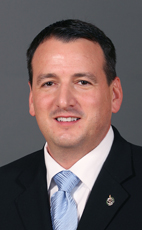
Team Training Opportunities Outlined by Greg Rickford

THUNDER BAY – “This team-based training is providing a valuable experience for students and postdoctoral fellows to learn practical skills and to engage in cutting-edge, multidisciplinary and, in some cases, international research,” said Isabelle Blain, Vice-President of Research Grants and Scholarships at NSERC. “Exposing our trainees to an innovative, collaborative training environment will enable them to succeed in careers that contribute to the world’s top research.”
“Our Government will continue to support research that brings together academic and industrial partners because we recognize that long-lasting returns can be realized when academic research is integrated with private sector know-how,” said Minister of State Rickford. “We remain committed to investing in the next generation of innovators, whose work promises to keep Canada competitive on the global stage and bolster our economy through partnerships with the private sector.”
Thunder Bay Luncheon Wednesday
Minister Rickford will provide an outline of his new role and the activities that are ongoing within the Federal Government to ensure that we harness the potential of the Ring of Fire for current and future generations.
Young researchers will be provided with the training opportunities necessary to help them transition from trainees to productive employees in the Canadian workforce, therefore bringing their expertise to fulfill private sector needs. Minister of State (Science and Technology) Greg Rickford was at McGill University today in Montreal to announce funding for new training initiatives in a variety of research areas, including genomics, climate change in the Arctic, clean combustion engines, and wireless technology.
The government will invest more than $24 million over six years in 15 initiatives through the Natural Sciences and Engineering Research Council of Canada (NSERC)’s Collaborative Research and Training Experience (CREATE) initiative to help science and engineering graduates add valuable job skills necessary in today’s labour market, to their academic achievements. Funded networks will be led by teams of Canadian university researchers who will help students develop leadership, entrepreneurship, communication and project management skills.
CREATE also promotes student mobility between universities and other sectors nationally and internationally. In 2011, an agreement was established with Germany to support a bilateral training program. Two of the CREATE recipients will work with the Deutsche Forschungsgemeinschaft, the German Research Foundation.
In its first three years, CREATE has involved 58 teams of researchers and has supported more than 2,400 students and postdoctoral fellows through funding and training.
McGill University received $1.6 million through CREATE to develop a multi-disciplinary training program in the fields of physics, biology and medicine. The network will provide internship, mentoring and training opportunities for the next generation of medical physicists that will nurture collaboration while also addressing the need to put new technologies into clinical practice.
Since 2006, the government has provided nearly $9 billion in new funding for science, technology and the growth of innovative firms. Of this amount, over $6 billion is in support of science and technology activities at postsecondary institutions, including increases in the budget of the Discovery Grants program. This funding has helped to make Canada a world leader in postsecondary education research and to create the knowledge and the highly skilled workforce required for a more prosperous economy.
NSERC is a federal agency that helps make Canada a country of discoverers and innovators for all Canadians. The agency supports some 30,000 postsecondary students and postdoctoral fellows in their advanced studies. NSERC promotes discovery by funding more than 12,000 professors every year and fosters innovation by encouraging about 2,400 Canadian companies to participate and invest in postsecondary research projects.













